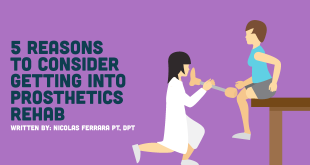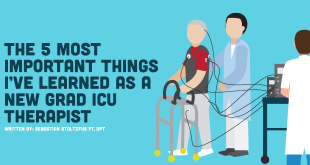If you are reading this, you probably have some interest in becoming a travel physical therapist right after graduation. Travel physical therapy is definitely one of the more unique career paths you can choose after graduation. You have the opportunity to explore different parts of America, expose yourself to different cultures, learn various techniques and approaches from different facilities and therapists, and receive a very good pay compensation to get rid of those nasty student loans from graduate school. However, if becoming a travel therapist is something you want to do right after school, there are some very important considerations, as the selecting and hiring process can be a bit trickier than a regular permanent job.
Why I chose travel physical therapy:
Professional Development:
I only have one major overarching goal for essentially everything I do. Be the best I can be, both personally and professionally.
Professionally, I want to be able to learn and acquire as much information as possible. However, I do not want the information I gathered to be from one source but from a variety of sources, so I can be as well-rounded as possible. I decided the best way to achieve this goal was to somehow find a way where I can just go to different place so I could absorb information and learn different approaches, techniques, and ways of thinking. This was one of the biggest appeals for travel PT, because I have the opportunity to do just that. Not to mention, by traveling I can also vastly increase my networking range. Depending how big you like to dream (whether you wish to begin a residency, open a clinic, or just create a great resume), I believe travel can provide the opportunity to make connections and get ideas on way to best approach future goals.
Personal Development:
I am passionate about making the most out of every day. I love new experiences, getting out my comfort zone, and just learning more about others. Although this is very possible by just staying at home, I thought that would playing it too safe, and I like danger. So I decided that traveling to places I haven’t been to before would be adventurous and an opportunity to learn about other people that I may not otherwise had the opportunity to meet.
Secondly, as of late I have been falling in love with international travel. However, I knew if I was take a permanent job, the best I could do was probably only travel for a week or two with paid vacation, and probably only at certain times of the year.
 NewGradPhysicalTherapy.com The Largest Online Resource For New Grad Physical Therapists
NewGradPhysicalTherapy.com The Largest Online Resource For New Grad Physical Therapists






Hi Demo! I am about to begin the second semester of my first year and have been considering travel PT as my post graduate path. In your experience, do companies typically provide a housing stipend? Also how long does an initial contract usually last? Lastly, I really love the idea of buying a travel trailer and taking several weeks to find and park at my destination. Does this sound realistic based on your experience? Great article- thank you!
I’ve been traveling for two years with Comphealth. Tax free stipends include funds for meals per work day housing per work day and travel expenses per contract. The amounts very contract to contract but it come out to about 1/3 of my total income. Buying a trailer is totally feasible just save all your bills associated with housing. I’ve never heard of any therapist being audited over their housing allowance but you never know it could happen.
Thanks for the response Matt!
I will check out that company. Thank you!
Hey Matt – it sounds like you have some good experience with travel therapy — can I ask you a couple of questions?
1. In your travel therapy experience, what have been 3 of the most difficult aspects to navigate?
2. If you could hand off one challenging aspect for someone else to do, what would it be?
3. If you could have a magic wand to assist you with any part of the travel therapy process, what would it do for you?
Thanks for your time!
Tim
Hi Jessica! Thanks for commenting. We have contacted Demo and he should drop by soon to address your questions 🙂 Meredith
HeyvJessica, I’m glad the article was able to give you some help. From my experience as aan traveler aand what my mentors and other travelers have told me, all agencies offer a travel stipend, if it doesn’t I would be very suspicious and would probably drop them cause the housing stipend is a big part of your pay check. The usual length of time for a contract is typically 13 weeks however all contracts can be extended or you might find contracts that are longer, for example I just started a contract in December in San Jose for 6 months. And I would agree with Matt about travel trailer. For what I know, it is feasible to wait it to find a location that have trailer parks in the nearby area as I know my mentor and another traveler I met had did the same thing. Just make sure you are working with a few different recruiters as some agencies may not have access to destinations that are trailer friendly. I hope this answers your question! And if you have anymore I will be happy to answer them!
Hi Demo, Thanks for your response and advice- It’s great to hear others are doing the trailer traveler thing as well! From the few companies I’ve researched online, the housing stipend info is a little vague. I assume that information is discussed when you contact the company and I was thinking I might wait for the start of my third year to begin interviewing them? Thanks again for sharing your experience, I’m feeling confident that travel PT is a great path for me!
No problem! In reference too the housing budget, it is very vague because that can change depending on location for example I made about $450 a week for contract in Arizona but then I make closers to $700 in my contract in San Jose because the cost of living is higher. And getting in contact with them during your last semester of graduate school is definitely the best because you will have a clearer idea of where you wanna go and your overall timeline!
OK, I was curious about that and it makes sense that it’s based on cost of living. Also, I was planning to do all hospital-based clinicals, IP acute, IP neuro and then outpatient ortho. I know you mentioned that SNF’s are the most common facilities for travel PT’s. Do you think it’s important to have an internship in a SNF / assisted living community, or will the inpatient settings I mentioned be sufficient? Thank you!!
I am a travel therapist that began travel therapy shortly after graduating in ?ay 2015. I couldn’t agree more about the importance of finding an honest recruiter who not only can keep it real with you, but also knows the market inside and out. As a new grad travel PT, I can not stress enough how important it is to find a recruiter who has a good track record with placing new graduates.
I work with ?iranda at Ardor Health Solutions and can’t say enough about her. Traveling as a new grad can be intimidating and she has been incredibly helpful throughout the process. She knows what is realistic for a new grad and works with you to find an assignment that will be a good match for you. She has gone above and beyond and I couldn’t be more thankful to have such an amazing recruiter in my corner!
MIRANDA. Sorry for the typo!
My name is Ariel Innocent since you are traveling Physical Therapist could i disscuss with you some questions and concerns i have. Is it possible you could email me at
Hello all! My name is Monica and I am going to be graduating from my DPT program in May and plan to begin traveling soon after graduation. I am beginning to research a lot about pay rates, etc and I am finding that many people rely quite heavily on the housing stipends to make up a big portion (about 1/3) of their travel pay…which as a travel PT is one of the bigger incentives. I am wondering exactly how this is supplied, and if it’s uniform throughout each company. For example, when you are saying that you make 400$/month as a travel stipend, is that untaxed income because you claimed a tax home? Or is that an average net pay after taxes? I guess I’m trying to figure out how important it is to claim a tax home to receive this stipend.
Thanks!
Hey Monica,
That’s a good question. So what you said is true the housing stipend does make a big part of your paycheck up. However housing stipend vary depending on location. Usually it depends on the cost of living in that area, i believe. For instance I would expect to see a little more money for your housing in cali versus like Montana.
The $400 would be untaxed, assuming you have a tax home. For example let’s say I get paid $1600 weekly (after taxes) Making 22.50 an hour. 22.50 x40 hours would be $900 a week. That money will be taxed. For argument sake and to keep it simple (I’m not good with math), let’s say after taxes on 900 you make $600 (this is just the hourly rate). The remaining $1000 that make up your paycheck is your housing and food stipend that is untaxed (as long as you have a tax home). $1000 (untaxed) + $600 (money you make after the 22.50/ hour) is taxed = total paycheck.
Tax home is very important because if you don’t have one claimed instead of making 1600 a week you can end up making only 1200 per week or less depending on the state. Which is a minimum of 1600 less per month. Over the course of the year that’s almost 20000 you lost from not having a tax home. Not to mention, I think you are able to get a little more from your tax return with claiming a tax home.
Also the thing that may be uniformed throughout the company is how much your hourly rate is. But that can always be negotiated!
I hope this helps. Let me know if you have other questions!
My name is Ariel Innocent i am interested in the career in Travel PT but i wanted to know how long is the extension of the contracts last? And what if upon my travel i wanted ro return to school is that possibility?